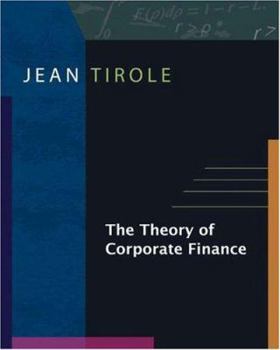The Theory of Corporate Finance
"Magnificent."--The Economist
From the Nobel Prize-winning economist, a groundbreaking and comprehensive account of corporate finance
Format:Hardcover
Language:English
ISBN:0691125562
ISBN13:9780691125565
Release Date:January 2006
Publisher:Princeton University Press
Length:656 Pages
Weight:0.05 lbs.
Dimensions:1.6" x 8.2" x 10.3"
Customer Reviews
5 ratings
A great theoretical reference
Published by Thriftbooks.com User , 15 years ago
I found this book to be a very clear, step-by-step introduction to the fundamental theories of corporate finance. It relies heavily on a simple Investment -> {R,0} payoff model to unify and explain basic theories. You might quibble with this approach, but it proves to be an excellent way of structuring and outlining finance theory in a cogent, step-by-step conceptual framework. I wish they could use it at the MBA level, given the horrendously awful understanding of basic issues that most MBA's have. To be clear, it's definitely a Ph.D. level text, but I'd say it's reasonably accessible to anyone with good math skills and a strong desire to learn the fundamentals of modern financial economics. <br /> <br />As a bonus, it's also relatively cheap. Thanks Jean.
an enchiridion on corporate finance
Published by Thriftbooks.com User , 17 years ago
This book is the best enchiridion for any kind of studies in finance. All students are advised to read it;they will find it useful, not only due to its deep and scrutable meanings, but also because it awakes profound questions to the reader and urge him to make his own research on a sector in finance which is still in its infancy. This handbook helped me a lot with my dissertation, as it concentrates in its pages various and many topics on corporate finance.
Excellent Theoretical Approach
Published by Thriftbooks.com User , 18 years ago
Even a few years ago the theory of corporate finance was relatively simple. To be sure, everyone knew that the models weren't perfect. The close cooperation between favorite trading partners and/or between companies and their governments, the impact of taxes, currency issues, and a whole raft of financing instruments that never existed before has forced drastic changes in the basic theories of corporate financing. This book employs a single, elementary model in order to illustrate the main economic insights. While this approach doesn't take into account all of the various extentions that more complex models might give, it is much easier for the student to get accustomed to one model and then to modify it as circumstances warrent. This book is aimed at the advanced undergraduate student, or more likely one at the graduate level. While not nearly as mathematically oriented as some books, this one does include enough that the student should consider calculus as a prerequisite. All in all, this book does a supurb job of developing a theory that reflects the real world as it exists today.
Superb
Published by Thriftbooks.com User , 18 years ago
Tirole's book is one of the very few formal texts to cover corporate finance theory. It is structured around a few basic models which are changed/extended in myriad ways in order to illuminate this or that topic. This allows the reader to cover a lot of ground with minimal investment. I have taught a master's level finance course based on the notes that the book is built on and found it a pleasure. I found it useful to cover some basics of principal agent theory before covering Tirole's material, as some knowledge of information economics is assumed. Laffont and Martimort's book makes the transition smooth as they essentially use the same basic two action two outcome setup as Tirole's first couple of chapters. I very much doubt that a superior book will appear on the shelves for some time, that is of course, until Tirole decides to update his text some years from now.
Good PhD book
Published by Thriftbooks.com User , 18 years ago
This is definitely a good PhD-level book on Corporate Finance. It is based on Jean Tirole's lecture notes at Toulouse and definitely follows his research style. It uses theoretical models with agency problems to explain several empirical findings of corporate finance. A great purchase for grad students interested in financial THEORY.





